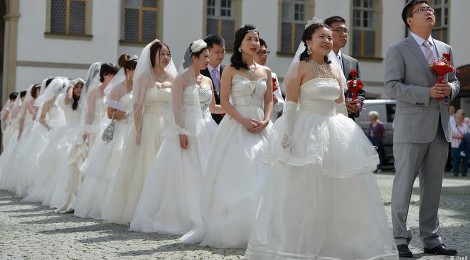
Women hold up an half of the sky? Not when it comes to the housing market
“Women hold up half of the sky”: this slogan stood out on propaganda posters in the 1950s showing a man and a woman working side by side. Proclaimed by Chairman Mao himself, the aim of the slogan was to help women’s emancipation from their traditional roles and promote their social status. A few years later, China had its first female Vice Premier, Wu Guixian, who held the position for one year during the Cultural Revolution.
Half a century later, women’s proclaimed “half of the sky” has not become substantially brighter, and someone would say it is not really a half… a quarter of the sky maybe? In contemporary China this is especially evident when looking at the real estate market and the enormous accumulation of wealth linked to it. It is estimated that Chinese men own 87 percent of the country’s ¥109 trillion property market and, even if women give a substantial contribution to the purchase, only 30 percent of them holds part of the deed of the marital property. This picture has been remarkably enlarging since 2011, when a decision of the supreme court on marriage law established that in case of divorce, if there is no agreement on how to share assets, the residential property will be granted entirely to the person it is registered to: the husband in the vast majority of cases.
In China, marriage is inextricably linked to home buying and, more important, men are the ones supposed to own the property, the latter being considered a necessary condition to find a bride. For Chinese, there is no marriage without a house. The situation is worsened by the fast rising price of the Chinese housing market, where buying an apartment is less affordable even compared to London on average income. Hence, mortgages and marriages in China are deeply intertwined.
Some economists argue that the existing sex ratio imbalance – about 118 boys are born for every 100 girls – might as well contribute to the soaring prices, because it increases the competition among men to find a bride. In fact, to have better chances to get married, men are inclined to invest larger amount in the house market, causing a chain reaction. But nowadays, women can both contribute to the purchase – cause they are earning more and being the only child are receiving more money from their families – and must contribute to pool resources to afford a house. According to the statistics, Chinese women now contribute in the 70 percent of the cases for mortgages and in the 90 percent for cash purchases. Then why do not they push to legally possess part of the house?
The new interpretation of the marriage law, combined with old costumes and social restrictions, has been excl uding Chinese women from what the sociologist Leta Hong Fincher described as the “greatest accumulation of property wealth in history”. Even if the condition of women in China has overall distinctively advanced in the last years, the phenomenon of the so-called leftover women still has a tremendous impact on Chinese society, also with regards to a great number of well-educated women. The term leftover women, 剩女 shengnu, has been used since 2007 by China’s Minister of Education to define an urban professional woman over the age of 27 who is still single. The message is clear: these women are focusing too much on their career and are therefore running out of time for having children and build a family.
uding Chinese women from what the sociologist Leta Hong Fincher described as the “greatest accumulation of property wealth in history”. Even if the condition of women in China has overall distinctively advanced in the last years, the phenomenon of the so-called leftover women still has a tremendous impact on Chinese society, also with regards to a great number of well-educated women. The term leftover women, 剩女 shengnu, has been used since 2007 by China’s Minister of Education to define an urban professional woman over the age of 27 who is still single. The message is clear: these women are focusing too much on their career and are therefore running out of time for having children and build a family.
In 2015 women in China are still under enormous pressure to find a husband and have children before turning 30 year-old. Living with the fear of being leftover, women often agree to the husband taking the pride of owing the whole house. Would properties not be so expensive, a number of young women in career could afford and would most probably be willing to buy their own homes.





